General
Mind Education, an Enabler of National Development
Published
5 years agoon
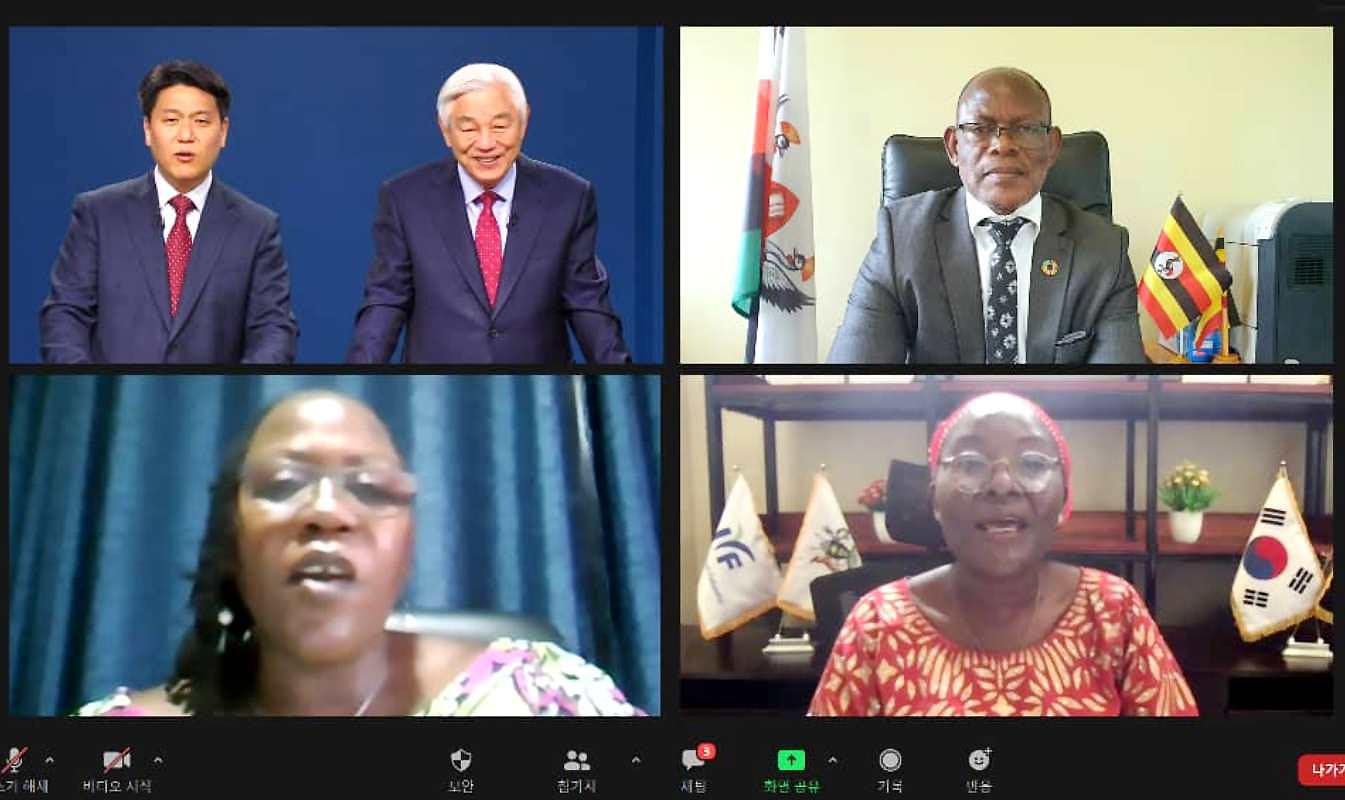
In 1962, the GDP per capita of South Korea was US$90. Matters weren’t helped by the fact that country had poor soils, no mineral resources to exploit and hostile neighbours. During the winter when the temperatures dropped to -5 degrees centigrade, it was not uncommon for the less fortunate to either starve or freeze to death.
This vicious cycle of poverty continued until the 1960s when President Park worked hard to introduce Mind Education to help change the mindset of the South Korean population. Mind Education programmes were introduced in school curricula and as the mindsets of people changed, the country evolved. Today, South Korea is ranked highly among developed countries with a GDP per capita above US$30,000.
This picture of South Korea’s remarkable transition was painted by Prof. Johan Kim, Chairman of the International Youth Fellowship (IYF) in East Africa. Prof. Kim made his presentation at the virtual Mind Education Workshop for staff of Makerere University hosted by the Vice Chancellor Prof. Barnabas Nawangwe on Friday 6th November 2020. The Workshop was organized by the Principal, College of Humanities and Social Sciences (CHUSS), Assoc. Prof. Josephine Ahikire and the Dean, School of Psychology, Assoc. Prof. Grace Milly Kibanja in partnership with IYF.
Welcoming participants to the workshop, Dr. Kibanja shared that the School of Psychology had been collaborating with IYF since 2015. Together, the School and IYF have organised youth conferences both within and outside the university and reached out to prisons to conduct Mind Education.
“In 2019 we piloted the Mind Education Course among second year students of the Bachelor of Industrial and Organisational Psychaology and this is still ongoing. We are planning to conduct an evaluation of the programme soon” added Dr. Kibanja.
Explaining why the School had taken lead in this initiative, the Dean said that since Psychology is the scientific study of the mind and behaviour, as sure as night follows day, training in upright judgment and clear reasoning would inevitably lead to positive behavioural change. “Mind Education is geared towards strengthening our hearts and minds to overcome resistance to change by rising above our unpleasant desires.”
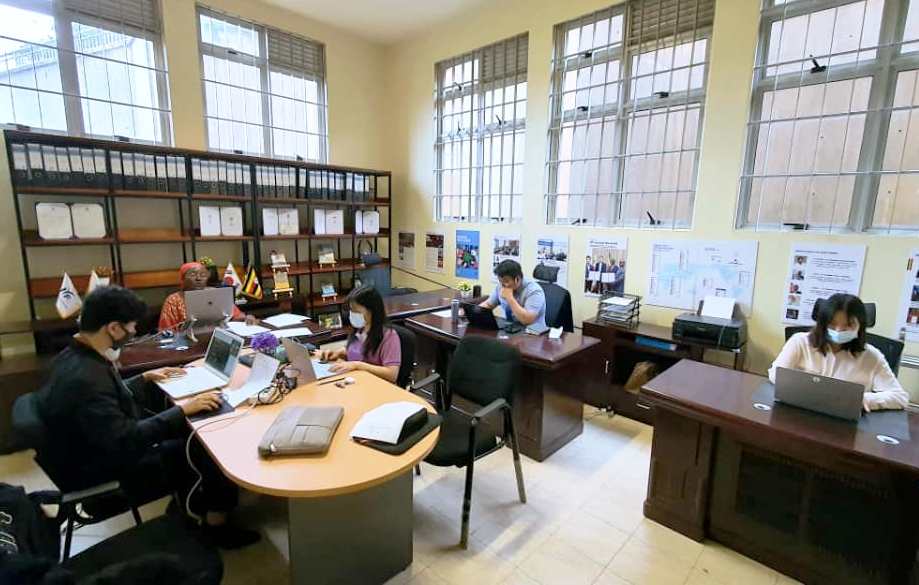
In her remarks, the Principal CHUSS observed that it is important to generate a network of people who will not just complain about problems but seek to create solutions and forge a way forward. “As Principal, I am happy about Mind Education because I think it will go a long way in creating a generation that will take the future in its hands and craft solutions accordingly.”
In this regard, she thanked the Vice Chancellor, Prof. Nawangwe for always being on the lookout for opportunities that can foster the delivery of Makerere University’s mandate. “The mindset change conversation is very important to us as an institution and we need to mainstream it in the programmes that we teach at Makerere.”
Dr. Ahikire pointed out that although people on the African continent face a number of challenges, the COVID-19 pandemic has illustrated that we have the capacity to come up with appropriate solutions. Strengthening this mindset, she noted, would enable us to train a resilient generation.
“I therefore thank the International Youth Fellowship for this very important collaboration with the School of Psychology and Makerere University in general. We welcome you and we embrace the Mind Education Programme as we build for the future.”
Prof. Johan Kim in his presentation noted that the mindset change in South Korea had spawned a generation of optimistic innovators and researchers who helped to turn their national economy around. This evolution meant that the hitherto disadvantaged country had gradually become a leading global exporter of goods whose raw materials they didn’t even produce.
“Today, South Korea is the seventh leading exporter of refined petroleum, a leading exporter of coffee and for a country that doesn’t have iron ore, home to the largest shipbuilding companies in the world” remarked Prof. Kim.
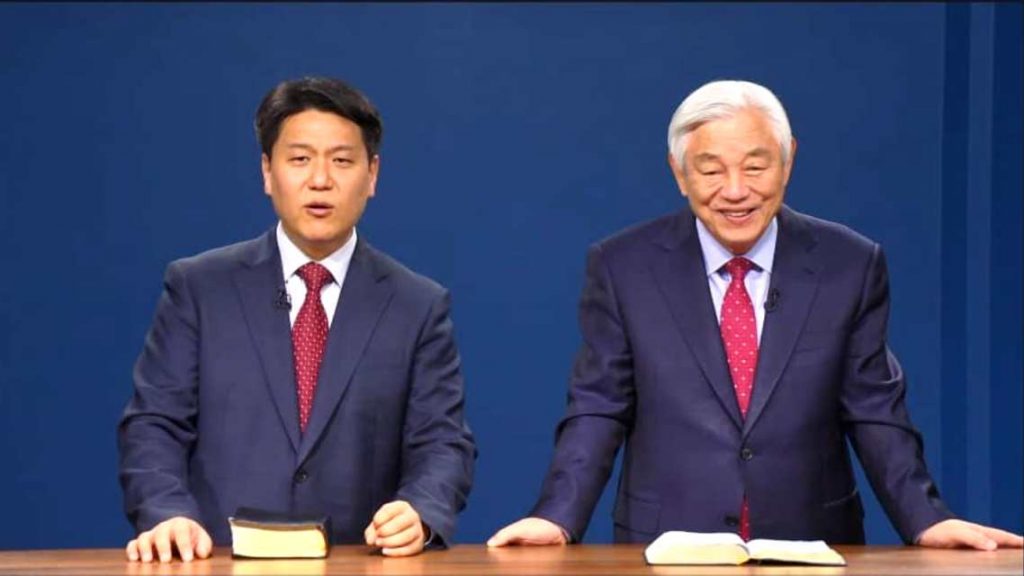
He concluded his presentation with the illustration of Koi’s law. Koi is a Japanese fish whose growth is proportional to the environment it is kept in. In a fish bowl, it grows to from 5 to 8cm, while in a pond it grows from 12 to 25cm. However, when the same fish is placed in a river it grows to a whooping 90 to 120cm. “The environment in which we keep our minds will determine where (how far) we go.”
Prof. Kim reassured that once the youth acquire a strong and positive mindset through Mind Education, the way they look at their country is bound to change. “Through Mind Education, we shall be able to move the mindset of our young people from the fishbowl to the pond to the river.”
As participants were still absorbing Prof. Kim’s fascinating presentation, it was time to be treated to yet another captivating performance, this time by the Gracias Choir, an orchestra and choral ensemble founded by Rev. Dr. Ock Soo Park in the year 2000. Their melodious and well-assembled performance of the Ugandan National anthem and Yansumulula Nze; a Luganda gospel song, amazed the participants.
Following this spectacular performance, the Keynote Speaker Rev. Dr. Ock Soo Park “took to the stage” to deliver his Special Lecture on Mindset with through his proficient translator. He began by stressing the importance of applying ones heart to scenes that play out daily, noting that people who’d mastered the art of taking care of and using their heart were a world apart.
Like a true Evangelist, Rev. Dr. Park delivered his special lecture in storytelling fashion, starting off with his own life as a nineteen year old and the difficulties he faced to the story of the beautiful, well-educated young lady who against all advice chose to marry a crippled uneducated young man.
He captivated his audience by painting a picture of the uphill task faced by the girl in breaking the news to her parents, to the suspicion she aroused from the young man’s family, which suspicion melted into pure bliss when they discovered how serious she was. Rev. Dr. Park had us all eating out of the palm of his hand as he narrated how this love story progressed into marriage, complete with all the facial expressions, appropriate sounds and hand gestures, leading us past blooming flowers up the mountain to the peak.
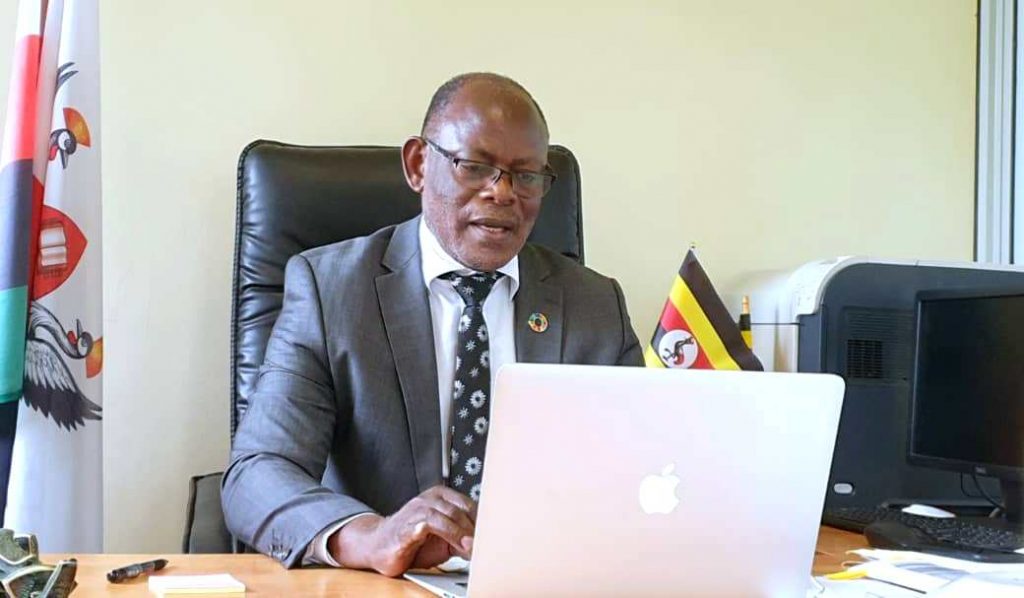
Suddenly, the beautiful tale veered off, taking a dark ghastly turn. Happily ever after gave way to ominous foreboding as the young man’s envy and rage overwhelmed his sense of reason. Mistaking his beautiful bride’s market errands for moments spent cavorting with other able-bodied men, he resorted to violent assault, shattering body and heart, a sad turn of events, a bitter end.
The Evangelist now had us where he wanted. It was time to deliver his blow, or so we thought. He then switched gears, shifting to a tale of South Korean car manufacturers and how the power of Mind Education had turned this sector’s fortunes around. Having depended on the Japanese to supply car engines for their brands for years, the South Koreans felt that they had gained sufficient experience to assemble their own and therefore asked their former supplier to teach them this skill. This request had been met with persistent “it’s too hard” responses year after year. When the South Koreans threatened to make their own engines, this announcement was received as the joke of the century by the Japanese.
Frustrated and insulted, the South Koreans had returned home, assembled their teams, shared their vision to build their own engines going forward and embarked on the herculean task. As fate would have it, they were pleasantly surprised to learn assembling car engines wasn’t as hard as the Japanese had made it seem. The rest as they say is history. Today South Korean car exports are worth billions of dollars.
“If you think more deeply, you get to think of things other people don’t. Leave behind your first level of thought and try to embrace deep thinking. If you go about life thinking deeply, you will live a blessed glorious life” concluded Rev. Dr. Park.
In the reactions that followed, a participant wondered why mindset change has been less experienced in Africa and whether the environment had any effect on this. In response, Prof. Kim noted that South Koreans too were in the past more concerned about basic living (eating and sleeping), and quitessentially focused more on how to become rich. “Many people in Africa are focusing on the materialistic or hardware more than the software part of our life. We need a lot of awareness through Mind Education especially for the youth so that they can think more in terms of development than daily needs.”
Another participant sought to find out whether frustration plays a role in mindset change. Prof. Kim responded by sharing that a weak heart and mindset are the primary reason why people are easily frustrated or stressed by anything. “This is because such a person is usually avoiding burdens or difficulties of life. When we continuously allow our mindset to collide with burdens and difficulties, our hearts become stronger. As such, we are able to easily overcome hardship when it comes our way.”
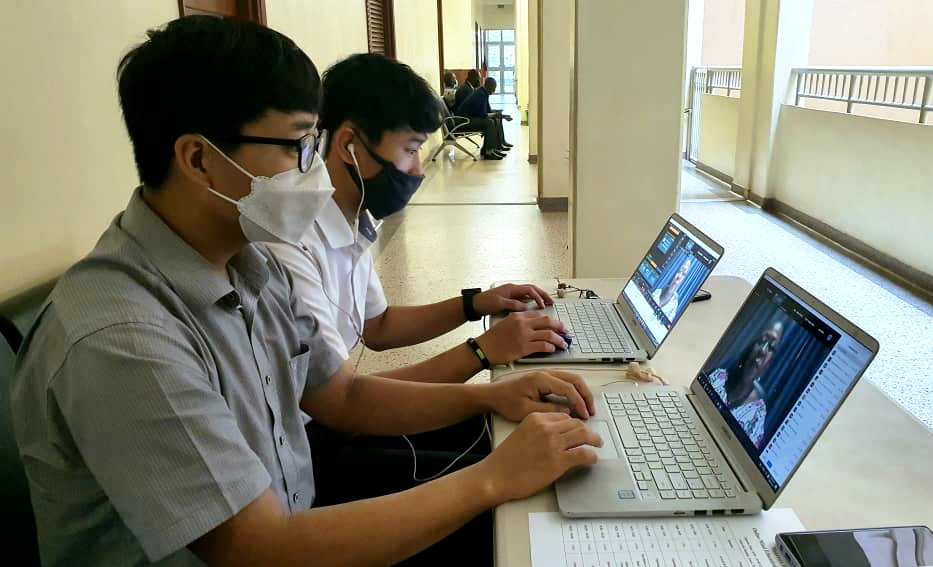
Delivering the closing remarks, the Host, Prof. Barnabas Nawangwe shared that civilization started in Africa 5,000 years ago and for over 800 years, the Moors occupied Spain. Whereas these ancient civilizations had collapsed, the Vice Chancellor opined that it was still possible for Makerere University to be inspired by the South Korean success and as the top black University lead the mindset change campaign. “For the last few weeks, I have seen a lot coming out of Makerere University in the form of research and innovations from every college. This is commendable.”
Prof. Nawangwe observed that whereas our population is exploding, our resources are not and as such a quick solution is needed to address this. As a first step, the School of Psychology was working closely with IYF to explore how to incorporate Mind Education into the curriculum. The Vice Chancellor also shared that a second workshop was in the offing and staff would be informed about the dates accordingly.
He thanked Rev. Dr. Park for delivering the keynote, as well as Dr. Ahikire, Dr. Kibanja and the IYF representatives, Prof. Kim and Pastor Part for organizing the Workshop. He equally thanked all participants taking time off to attend the workshop. “We cannot continue leaving our fate to chance; we have this fate in our hands.”
Article by Public Relations Office.
Related article
President Museveni Launches National Mindset Education Programme
You may like
-


How People Earn a Living is Contributing to Malaria Risk in Uganda, Study Finds
-
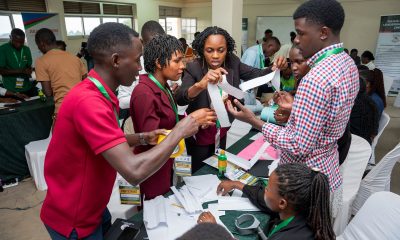

UNDP and JNLC hold training in Fort Portal: Participants equipped with skills in Advocacy and Gender Equality, Team Building, Inclusive Leadership, and Financial Literacy
-
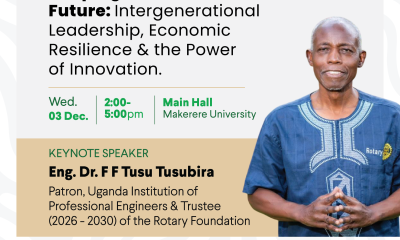

Illuminating Visionary Leadership: Introducing the Keynote Speaker for the 2025 Emmanuel Tumusime Mutebile Annual Public Lecture
-
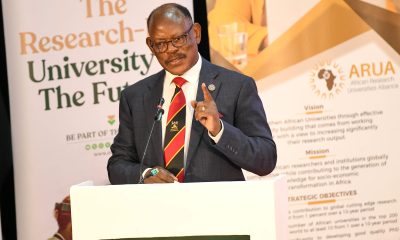

Building for the future: Makerere Vice Chancellor calls for collaborative research and innovation to drive human capital development in Africa
-
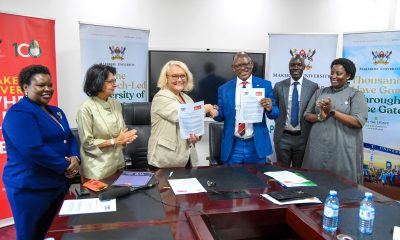

Mak and University of the West of England Sign MoU to Advance Research, Innovation and Skills Development
-
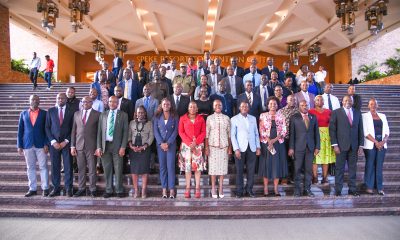

Makerere University Council and Top Management Convene Strategic Planning Retreat
General
Makerere University commemorates 13 transformative years of partnership with Mastercard Foundation
Published
2 days agoon
March 2, 2026
On Friday, 27th February 2026, Makerere University proudly celebrated 13 years of a significant partnership with the Mastercard Foundation, a prestigious independent organisation headquartered in Toronto, Canada. Since its inception in 2013 with the launch of the Scholars Program-currently headed by Prof. Justine Namaalwa, this collaboration has grown significantly, expanding to include two additional initiatives: The E-learning Initiative-headed by Prof. Paul Muyinda Birevu and the Africa Climate Collaborative-headed by Prof. Gorretie Nabanoga. This long-term partnership underscores the shared commitment to fostering education, innovation, and sustainability in Uganda and across Africa.
The colourful event coincided with the 76th Graduation Ceremony, during which Makerere University honoured Ms. Reeta Roy, the Founding President and CEO of the Mastercard Foundation, with an honorary Doctor of Laws.

In her commencement speech, Ms. Roy thanked Makerere University for considering a partnership with the Mastercard Foundation and for conferring upon her a prestigious honorary award.
“Mastercard Foundation is honoured to collaborate with this esteemed university, and I appreciate the recognition through this award. I am excited to be associated with Makerere University and look forward to actively embodying its values. Joining the broader community of alumni from this distinguished institution is a privilege, and I am eager to contribute to its legacy,” stated Ms. Roy.

During the reception in honour of Ms. Roy, the Chairperson of Makerere University Council, Dr. Lorna Magara, acknowledged the invaluable support from the Mastercard Foundation. She emphasised the profound impact of the Foundation’s various initiatives, particularly the scholarships for disadvantaged youth, which enable them to access higher education and opportunities that might have otherwise been beyond their reach.
“On behalf of the Makerere University Council and the broader University community, I extend our sincere gratitude to Mastercard Foundation for its commitment to collaborating with Makerere University in various endeavours, especially for providing scholarships to our underprivileged young people who would never have stepped inside a lecture room at the University.” Dr. Magara stated.

Dr. Magara, in a special way, thanked Ms. Roy for her transformative leadership and unwavering commitment to supporting young people in Africa, citing her efforts to ensure young people get their voices heard.
“As a university, our business is with young people. We are therefore committed to providing the environment and education that deliver meaningful pathways. We will provide an environment that ensures young people have a voice and agency to create meaningful change in society.” Dr. Magara pledged.

Dr. Magara further congratulated Ms. Roy on her honorary Doctor of Laws from Makerere University, noting that it is the university’s highest honour for individuals who have excelled in their careers.
“On behalf of the Makerere University community, I would like to extend my heartfelt congratulations on your honorary Doctor of Laws. This esteemed recognition represents the highest honour our institution can bestow on individuals who have demonstrated exceptional achievement and excellence across various facets of their career.” Dr. Magara remarked.
Prof. Justine Namaalwa, the Program Director of the Mastercard Foundation Scholars Program and the Coordinator for all Mastercard Foundation Initiatives at Makerere University, expressed her appreciation for the thirteen-year collaboration between Makerere University and the Mastercard Foundation. She highlighted that the partnership had yielded significant, impactful results.

“In 2013, Makerere University partnered with the Mastercard Foundation to educate the next generation of transformative African leaders who can positively impact their lives, their communities, and the economies of Africa. The partnership has had a significant impact. I thank the University Management and the Foundation team for this visionary collaboration,” remarked Prof. Namaalwa.
Prof. Namaalwa articulated that the partnership with the Mastercard Foundation is primarily focused on empowering young people as agents of change for transformational leadership in Africa. She presented compelling statistics demonstrating the positive impact of the scholars’ program, highlighting the success of individuals who have completed their education and their subsequent professional experiences after university graduation.

“This partnership focuses on young people, aiming to create positive change in their lives. To date, the Scholars Program has graduated 974 alumni, with 48% securing formal employment, 18% starting their own businesses, 8% participating in internships, and 5% pursuing further education. Overall, 72% of Scholar alumni are actively engaged in employment or entrepreneurship,” Prof. Namaalwa stated.
The colourful event showcased a dynamic array of activities that highlighted the entrepreneurial spirit of Scholars and alumni from the Mastercard Foundation at Makerere University. Attendees enjoyed a mini-exhibition featuring innovative products from these ventures.

A video documentary illustrated the positive impact of the three Mastercard Foundation initiatives. The event also featured inspiring poetry recitations by Scholars and a lively atmosphere of music and dance, creating an engaging and memorable experience for all participants.
The high-level event was attended by senior University officials, led by the Chairperson of Council, Dr. Lorna Magara; the Vice-Chancellor, Prof. Barnabas Nawangwe; the Vice-Chancellor, Academic Affairs, Prof. Sarah Ssali, Deputy, and the Ag. Deputy Vice-Chancellor, Finance and Administration Prof. Winston Tumps Ireeta. Mr Yusuf Kiranda, the University Secretary; and Prof. Buyinza Mukadasi, the Academic Registrar, Chancellor Emeritus-Prof. Ezra Suruma, former Chairperson of the Steering Committee of Mastercard Foundation Scholars Program-Prof. Umar Kakumba, and the Deputy Executive Secretary, RUFORUM, and former Program Coordinator of the Scholars Program at Makerere University-Dr. Florence Nakayiwa, among many other officials graced the function.

The event was also graced by a high-level delegation from the Mastercard Foundation, led by Ms. Reeta Roy, the Founding President of the Foundation, and included the Mastercard Foundation Teams from the Country offices in Kigali, Nairobi, and Kampala; the Program partners; the Mentors, Scholars and alumni; as well as the Program staff of the three Mastercard Foundation Initiatives at Makerere University.
At the end of the event, Makerere University honoured Ms. Reeta Roy with University memorabilia, including a pencil-drawn portrait, a pencil-drawn photo of the Ivory Tower, and other Ugandan crafts. Ms. Roy cut a graduation cake together with the 10 graduates of the 76th graduation ceremony from the Mastercard Foundation Scholars Program.
Bernard Buteera is the Principal Public Relations Officer for the Mastercard Foundation Scholars Program at Makerere University.

It is with great pleasure that I welcome you to this edition of Mak News Magazine, a publication that continues to chronicle Makerere University’s journey as a centre of academic excellence, innovation, and societal transformation.
The stories featured in this issue vividly demonstrate Makerere’s unwavering commitment to addressing national, regional, and global challenges through research, partnerships, and people-centred solutions. They reflect a university that is deeply engaged with society, one that applies knowledge not only to advance scholarship, but also to improve lives.
A recurring theme in this edition is innovation for resilience and inclusion. From the College of Agricultural and Environmental Sciences’ Healthy Soy Initiative combating child malnutrition amid climate change, to the cutting-edge work of CEDAT’s Team Green Minds integrating IoT into agriculture, Makerere continues to harness science and technology to respond to pressing development needs. Equally inspiring is the College of Natural Sciences’ success in securing international funding to scale up fish processing technologies, with a deliberate focus on empowering women and strengthening livelihoods.
This issue also highlights Makerere’s growing role in advancing health and wellbeing. The launch of the Early Intervention Psychiatry Services Clinic at Makerere University Hospital marks an important step in strengthening mental health services, while the Hospital’s transformation from a modest sickbay into a centre of excellence stands as a testament to decades of strategic investment, dedication, and service to the nation.
Our commitment to education access and global engagement is equally evident. Strategic partnerships, such as that between the College of Education and External Studies and the Uganda Vocational and Technical Assessment Board, are expanding pathways to quality education. The establishment of the first-ever United States Studies Centre in the Great Lakes Region positions Makerere as a hub for dialogue, research, and policy engagement on global affairs. We also celebrate our vibrant international community, with graduates drawn from 67 nationalities—affirming Makerere’s status as a truly global university.
This edition further showcases initiatives that ensure long-term institutional sustainability, including the launch of the CoCIS Endowment Fund, infrastructure developments such as the modern hostel at Buyana Farm, and transformative programmes supported by the Mastercard Foundation that continue to empower young people across the continent.
As you read through these pages, I invite you to reflect on the collective effort of our students, staff, alumni, partners, and supporters whose contributions make these achievements possible. Together, we continue to shape Makerere University as a place where knowledge serves humanity.
I wish you an engaging and inspiring read.
Prof. Barnabas Nawangwe
VICE CHANCELLOR

The Board Chairperson of the Makerere University Endowment Fund (MakEF), Dr. Margaret Blick Kigozi, has urged graduands in Health and Life Sciences to uphold professional ethics and serve humanity with diligence and compassion.
Her appeal came during the passing out of graduates from the College of Natural Sciences (CoNAS), the College of Veterinary Medicine, Animal Resources and Bio-Security (CoVAB), the College of Health Sciences (CHS) and the School of Public Health (SPH) on Day Two of the 76th Graduation Ceremony of Makerere University.
“Class of 2026, you are now part of the Makerere legacy. Wherever you go clinics, laboratories, farms, boardrooms, or classrooms, you carry this institution with you. Serve your patients with skill and compassion. Care for animals and communities responsibly. Question boldly and keep learning,” Dr Kigozi, said.
Delivering the commencement address, Dr. Kigozi lauded the graduates for their dedication to careers that directly impact lives and communities. She encouraged them to use their knowledge generously and exercise their power gently.
“Your education has trained you to ask better questions. Your humanity must guide the answers. Never forget that behind every chart, every case, every animal, every experiment, there is life. And life deserves care, patience, and dignity. Give every person you come in contact with care, patience and dignity,” Dr Kigozi, noted.
As the graduates embark on their professional journeys, Dr. Kigozi emphasized the importance of cultivating basic business acumen and financial literacy to ensure sustainability in their work.

“You do not need to become accountants but you must be able to read the essentials: understand simple financial statements, budgets and key metrics so you can judge whether a clinic, lab, or program is sustainable. You are encouraged to start your business. There are numerous investment opportunities in your areas of training. You can provide services to our people and create jobs,” Dr Kigozi, said.
She shared candidly how, when she first stepped into leadership, she realised she did not understand balance sheets or budgets well enough. So, she returned to Makerere for short courses to strengthen herself.
“A well-run Hospital, clinic or lab delivers better outcomes, attracts staff, and secures funding. Business savvy is not only about profit, it’s about sustainability and the freedom to serve ethically and effectively. Carry clinical skill with business sense so your work endures and grows,” Dr. Kigozi, noted.
Quoting renowned writer and producer Shonda Rhimes, creator of Grey’s Anatomy, who once reflected that succeeding in one area of life can sometimes mean falling short in another, Dr. Kigozi encouraged women graduates to intentionally balance professional ambition with family responsibilities.
“When one area thrives, another is often under strain. When Navio was graduating from school I had to manage the Presidential Investor Round Table on the same day as Executive Director Uganda Investment Authority. I chose my job and delegated his siblings to attend Navios graduation. I learnt from this. I choose family always after that thing you achieve once and keep forever,” Dr Kigozi, said.
In his speech, the Prof Barnabas Nawangwe, the Vice Chancellor, informed the congregation that Makerere’s ranking on all university ranking platforms has remained stable, placing Makerere among the top 10 African universities and within the top 4.5% globally.
“In the Times Higher Education global ranking, Makerere University made a formidable jump from the 1200-1500 bracket to the 800-1000 bracket. This was no mean achievement and I congratulate all members of the Makerere Community on this stellar performance,” Prof Nawangwe, said.
Trending
-

 Humanities & Social Sciences1 week ago
Humanities & Social Sciences1 week agoMeet Najjuka Whitney, The Girl Who Missed Law and Found Her Voice
-

 General1 week ago
General1 week ago76th Graduation Highlights
-

 Health2 weeks ago
Health2 weeks agoUganda has until 2030 to end Open Defecation as Ntaro’s PhD Examines Kabale’s Progress
-

 Agriculture & Environment2 weeks ago
Agriculture & Environment2 weeks agoUganda Martyrs Namugongo Students Turn Organic Waste into Soap in an Innovative School Project on Sustainable Waste Management
-

 General2 weeks ago
General2 weeks agoMastercard Foundation Scholars embrace and honour their rich cultural diversity
